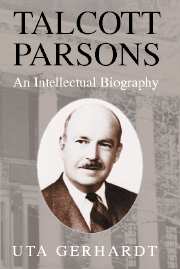Book contents
- Frontmatter
- Contents
- Preface
- 1 Understanding The Structure of Social Action
- 2 Parsons's Sociology of National Socialism, 1938–1945
- 3 The Harvard Social-Science War Effort and The Social System
- 4 A New Agenda for Citizenship: Parsons's Theory and American Society in the 1960s
- Epilogue: A Life of Scholarship for Democracy
- Biblography
- Name Index
- Subject Index
- Plate section
Epilogue: A Life of Scholarship for Democracy
Published online by Cambridge University Press: 09 October 2009
- Frontmatter
- Contents
- Preface
- 1 Understanding The Structure of Social Action
- 2 Parsons's Sociology of National Socialism, 1938–1945
- 3 The Harvard Social-Science War Effort and The Social System
- 4 A New Agenda for Citizenship: Parsons's Theory and American Society in the 1960s
- Epilogue: A Life of Scholarship for Democracy
- Biblography
- Name Index
- Subject Index
- Plate section
Summary
Parsons in many a secondary account has been deemed a prototypical Harvard professor – aloof from everyday life in supposedly single-minded concern for abstract theory, disengaged from political life as either apolitical or a dreamer à la Brave New World. This book has revealed both accusations as mere fabrications. Appreciation of Parsons as due him has been the rationale for this intellectual portrait.
This intellectual biography, using material from published and unpublished sources, has meant to reverse judgments that stigmatize this greatest of American sociologists. The sum total of Parsons's intellectual biography is how devoted he was to the defense of democracy, both in his scholarship and personal politics.
At the end of this book, let me cite the abundant evidence once more, documenting how in his scholarship and politics, he defended democracy in its most advanced stage yet, American society.
In his earliest work, culminating in The Structure of Social Action, Parsons's aim was to understand how sociology, through the works of four European writers, had contributed to analyzing the empirical salience of democracy – in a world troubled by political conflict with Nazi totalitarianism, then urgent menace to the contemporaryworld. He analyzed anomie that signaled insecurity as much as coercion, as the obverse of integration that fostered reciprocity and involved rationality in the essential Weberian sense. The work opposed Spencerian positivism when its message was voluntarism refined by methodology. It embraced the Weberian principle of “Wertfreiheit” when its baseline was to establish sociology beyond surreptitious advocacy of authoritarianism.
- Type
- Chapter
- Information
- Talcott ParsonsAn Intellectual Biography, pp. 276 - 280Publisher: Cambridge University PressPrint publication year: 2002

